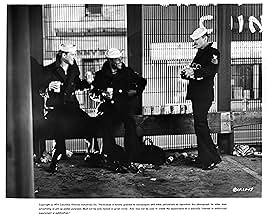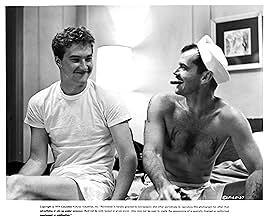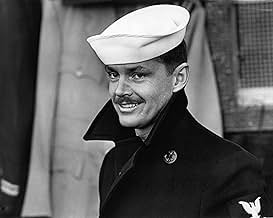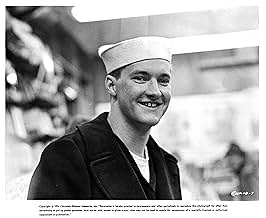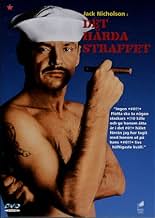IMDb रेटिंग
7.5/10
31 हज़ार
आपकी रेटिंग
दो नौसेना पुरुषों को एक युवा अपराधी को जेल में लाने का आदेश दिया जाता है, लेकिन रास्ते में उसे एक आखिरी अच्छा समय दिखाने का फैसला किया जाता है.दो नौसेना पुरुषों को एक युवा अपराधी को जेल में लाने का आदेश दिया जाता है, लेकिन रास्ते में उसे एक आखिरी अच्छा समय दिखाने का फैसला किया जाता है.दो नौसेना पुरुषों को एक युवा अपराधी को जेल में लाने का आदेश दिया जाता है, लेकिन रास्ते में उसे एक आखिरी अच्छा समय दिखाने का फैसला किया जाता है.
- 3 ऑस्कर के लिए नामांकित
- 6 जीत और कुल 9 नामांकन
Patricia Hamilton
- Madame
- (as Pat Hamilton)
फ़ीचर्ड समीक्षाएं
Nicholson's "Bad Ass" is a beautifully crafted piece of character. He cusses. He fights. He drinks. He's loud. No one else speaks Robert Towne's words better than Nicholson. In this film he overwhelms at every turn. In the bar scene, he shows brute anger and a desire for dominance. The scenes with a young Nancy Allen are delightfully witty because of Nicholson's schoolboy antics of getting a woman into bed.
It is the scenes with Randy Quaid (also wonderful) where Nicholson shines brightest. "Bad Ass" represents a paternal figure lacking in Meadows' life. He makes him a man by demanding he send back a hamburger if it's not cooked the way he likes it. He demands Meadows to stop crying and be a man. He demands Meadows to stand up for himself and fight when someone pushes his buttons. He demands Meadows to want to have sex, like other men his age. Nicholson's father figure image here is played off perfectly as Meadows sort of imitates things "Bad Ass" does. If Bad Ass has a beer, Meadows has a beer. If Bad Ass wants a woman, Meadows wants a woman. There's a secret trust between the two. It's unspoken, but it's there. That trust is broken in the end when Meadows tries to escape. It wasn't all a lie, Meadows just felt that it was time to stop learning and start moving.
It is the scenes with Randy Quaid (also wonderful) where Nicholson shines brightest. "Bad Ass" represents a paternal figure lacking in Meadows' life. He makes him a man by demanding he send back a hamburger if it's not cooked the way he likes it. He demands Meadows to stop crying and be a man. He demands Meadows to stand up for himself and fight when someone pushes his buttons. He demands Meadows to want to have sex, like other men his age. Nicholson's father figure image here is played off perfectly as Meadows sort of imitates things "Bad Ass" does. If Bad Ass has a beer, Meadows has a beer. If Bad Ass wants a woman, Meadows wants a woman. There's a secret trust between the two. It's unspoken, but it's there. That trust is broken in the end when Meadows tries to escape. It wasn't all a lie, Meadows just felt that it was time to stop learning and start moving.
Often regarded as a comedy-drama, 'The Last Detail' always stood out to me as a pure drama. It tells the story involving a group of Navy officers: a young and meek officer (Randy Quaid) steals some money but gets caught; the two others (Jack Nicholson and Otis Young) are to take him to prison. They (especially Nicholson) get somewhat attached to the boy when they see how young (ie.: don't know much of the world) and weak he is and decide to show him how to be a man before putting him away.
A look at the cast/crew shows how promising the film is. Hal Ashby is a fine director, whose films I always like/love (except maybe for 'Coming Home', which often gets too preachy and melodramatic); the screenplay is done by Robert Towne, the same guy who would later do 'Chinatown'; and the leading actor is Jack Nicholson, one of cinema's greatest actors.
Speaking of Jack Nicholson, he is just brilliant here. His character, 'Bad-Ass' Buddusky, is the type of character he is at best with: sarcastic and irreverent even when serious, yet very smart and caring in his own way. He acts as a father figure for the young Meadows (Quaid), trying to lift his mood and have him something to remember and be happy before having to face the harsh conditions of prison. Quaid and Young, alongside the supporting characters, end up overshadowed by Nicholson's performance, but they too make a great work with their characters.
As typical of a 70's and/or Hal Ashby film, 'The Last Detail' has great photography and is strangely comfortable to look at. The movie is very realistic too, with both situations and characters being very believable and sympathetic. The characters are very fleshed out and developed, making it difficult not to like or remain indifferent towards them. I've also heard that the way Navy/Marine officers are portrayed are also very close to the real thing, without forcing their portrayal as a way of criticism of the armed forces, which many directors would jump at the chance to do (specially considering the time this movie was made). In truth, I didn't feel that the film was a critique of the military like many say.
My only complaint on the movie is that it's supposed to be a comedy too. Yes, there are awkward situations and Jack Nicholson's typical rebellious way of dealing with everything; but the movie tends to make them more interesting than actually funny. Not that I'm saying this is bad; 'The Last Detail' is a remarkable movie in every aspect and one of the best pure dramas I've seen.
A look at the cast/crew shows how promising the film is. Hal Ashby is a fine director, whose films I always like/love (except maybe for 'Coming Home', which often gets too preachy and melodramatic); the screenplay is done by Robert Towne, the same guy who would later do 'Chinatown'; and the leading actor is Jack Nicholson, one of cinema's greatest actors.
Speaking of Jack Nicholson, he is just brilliant here. His character, 'Bad-Ass' Buddusky, is the type of character he is at best with: sarcastic and irreverent even when serious, yet very smart and caring in his own way. He acts as a father figure for the young Meadows (Quaid), trying to lift his mood and have him something to remember and be happy before having to face the harsh conditions of prison. Quaid and Young, alongside the supporting characters, end up overshadowed by Nicholson's performance, but they too make a great work with their characters.
As typical of a 70's and/or Hal Ashby film, 'The Last Detail' has great photography and is strangely comfortable to look at. The movie is very realistic too, with both situations and characters being very believable and sympathetic. The characters are very fleshed out and developed, making it difficult not to like or remain indifferent towards them. I've also heard that the way Navy/Marine officers are portrayed are also very close to the real thing, without forcing their portrayal as a way of criticism of the armed forces, which many directors would jump at the chance to do (specially considering the time this movie was made). In truth, I didn't feel that the film was a critique of the military like many say.
My only complaint on the movie is that it's supposed to be a comedy too. Yes, there are awkward situations and Jack Nicholson's typical rebellious way of dealing with everything; but the movie tends to make them more interesting than actually funny. Not that I'm saying this is bad; 'The Last Detail' is a remarkable movie in every aspect and one of the best pure dramas I've seen.
My absolutely favorite Jack Nicholson film has always and forever will be The Last Detail. I don't think he was ever better on the screen as William Baddusky of the United States Navy. I enjoyed his performance and the film itself on so many levels. Probably not surprising since the script was done by Robert Towne who would soon be teaming with Nicholson again for the critical and popular success Chinatown.
It's a simple story, not really any plot to the film. Two sailors, Jack Nicholson and Otis Young, both of them lifers in the Navy are stationed in Norfolk and get themselves an assignment to escort a prisoner to the Naval Stockade at Portsmouth. Of course with the per diem allowance for the two men and the prisoner and five days to travel in, Nicholson and Young are thinking of a mini-spree at government expense.
It comes to that and a lot more. the prisoner is newcomer Randy Quaid whose big crime is that he attempted to steal $40.00 from a charity collection box. For that he's getting eight years in military prison and a dishonorable discharge. A dishonorable discharge even today is not a good thing for one's resume.
As Nicholson and Young both remark, someone really stuck it to him. Let's face it what Quaid did in civilian life would probably be considered petty larceny and his jail time might be measured in days. Turned out it was the base commander's wife's favorite charity so it got stuck to him good. Sad because the indications we get is that Quaid was a troubled kid in civilian life and probably military service offered him a chance to straighten up and fly right.
It's done that for many others including Nicholson and Young who make it very clear even on this disagreeable detail they do like the Navy and like serving in it.
They've got five days to deliver Quaid to Portsmouth so the journey becomes quite the odyssey for the three of them up the Atlantic coast. The three men have a great chemistry between them, you get involved with their lives and really feel for young Quaid and his plight. Quaid gets shown a good time and maybe that's not such a good thing considering what he is facing.
The Last Detail is a nice realistic look at the military both its flaws and good points. A lot of similarity here in the issues raised to From Here to Eternity and if I mention The Last Detail in the same sentence favorably as From Here to Eternity, you know how good it must be.
It's a simple story, not really any plot to the film. Two sailors, Jack Nicholson and Otis Young, both of them lifers in the Navy are stationed in Norfolk and get themselves an assignment to escort a prisoner to the Naval Stockade at Portsmouth. Of course with the per diem allowance for the two men and the prisoner and five days to travel in, Nicholson and Young are thinking of a mini-spree at government expense.
It comes to that and a lot more. the prisoner is newcomer Randy Quaid whose big crime is that he attempted to steal $40.00 from a charity collection box. For that he's getting eight years in military prison and a dishonorable discharge. A dishonorable discharge even today is not a good thing for one's resume.
As Nicholson and Young both remark, someone really stuck it to him. Let's face it what Quaid did in civilian life would probably be considered petty larceny and his jail time might be measured in days. Turned out it was the base commander's wife's favorite charity so it got stuck to him good. Sad because the indications we get is that Quaid was a troubled kid in civilian life and probably military service offered him a chance to straighten up and fly right.
It's done that for many others including Nicholson and Young who make it very clear even on this disagreeable detail they do like the Navy and like serving in it.
They've got five days to deliver Quaid to Portsmouth so the journey becomes quite the odyssey for the three of them up the Atlantic coast. The three men have a great chemistry between them, you get involved with their lives and really feel for young Quaid and his plight. Quaid gets shown a good time and maybe that's not such a good thing considering what he is facing.
The Last Detail is a nice realistic look at the military both its flaws and good points. A lot of similarity here in the issues raised to From Here to Eternity and if I mention The Last Detail in the same sentence favorably as From Here to Eternity, you know how good it must be.
Don't let the fact that the DVD cover makes this movie look like gay porn keep you from seeing it.
Director Hal Ashby made a string of unfussy but very, very good films throughout the 1970s, and "The Last Detail" is one them. The story doesn't sound like much: two Navy officers are assigned to escort a third to the prison where he will be serving time. Along the way, the requisite male bonding ensues, and the older, jaded officer (Jack Nicholson) has a chance to reflect upon his own fortune and misfortune and be a sort of father figure, for better or worse, to his young and troubled charge (played extremely well by Randy Quaid).
Like all of Ashby's films, "The Last Detail" challenges things like duty and institutional authority, which made Ashby one of the most vocal of the anti-establishment directors from a volatile period of American history. But also like all of his films, it poses challenges in a low-key, non-confrontational way, without sacrificing its bite.
Well done.
Grade: A
Director Hal Ashby made a string of unfussy but very, very good films throughout the 1970s, and "The Last Detail" is one them. The story doesn't sound like much: two Navy officers are assigned to escort a third to the prison where he will be serving time. Along the way, the requisite male bonding ensues, and the older, jaded officer (Jack Nicholson) has a chance to reflect upon his own fortune and misfortune and be a sort of father figure, for better or worse, to his young and troubled charge (played extremely well by Randy Quaid).
Like all of Ashby's films, "The Last Detail" challenges things like duty and institutional authority, which made Ashby one of the most vocal of the anti-establishment directors from a volatile period of American history. But also like all of his films, it poses challenges in a low-key, non-confrontational way, without sacrificing its bite.
Well done.
Grade: A
I read somebody's comment that this film isn't "deep." I think that viewer missed a whole layer of the story. you have to keep in mind that this was written and produced during the vietnam war and released during the early months of Watergate.
The story is about these two working class sailors, who are completely disenfranchised, just "doing their job." They're good guys but in the end, don't lift a finger to stop a massive injustice. They don't even take the time to think about it, because they feel there's nothing they can do about it. They pay lip services to how wrong things are about the situation, but in the end they do what "the man" says and they're just as much to blame for the problem as the commanding officers above them.
Through the course of the film, the sailors meet a lot of "chatting class" folks who are mad at Nixon and discussing politics, and they meet Hari Krishnas who are chanting to change things, but nobody is really taking any ACTION. Everyone is pissed off at the injustice of the world but nobody does anything about it. It's about inaction. And that inaction slowly boils up in the main characters and turns into anger that brings the film to a sad end. (It's one of those great stories that gets you pissed off at the injustice in the world...)
Having said all that, on a more tangible level, the performances and scripting are full of emotion and Nicholson's and Quaid's performance are amazing and hilarious to watch. But this isn't really a comedy in the end...more tragic really (with some good laughs along the way).
Check it out!
The story is about these two working class sailors, who are completely disenfranchised, just "doing their job." They're good guys but in the end, don't lift a finger to stop a massive injustice. They don't even take the time to think about it, because they feel there's nothing they can do about it. They pay lip services to how wrong things are about the situation, but in the end they do what "the man" says and they're just as much to blame for the problem as the commanding officers above them.
Through the course of the film, the sailors meet a lot of "chatting class" folks who are mad at Nixon and discussing politics, and they meet Hari Krishnas who are chanting to change things, but nobody is really taking any ACTION. Everyone is pissed off at the injustice of the world but nobody does anything about it. It's about inaction. And that inaction slowly boils up in the main characters and turns into anger that brings the film to a sad end. (It's one of those great stories that gets you pissed off at the injustice in the world...)
Having said all that, on a more tangible level, the performances and scripting are full of emotion and Nicholson's and Quaid's performance are amazing and hilarious to watch. But this isn't really a comedy in the end...more tragic really (with some good laughs along the way).
Check it out!
क्या आपको पता है
- ट्रिवियाThe script was completed in 1970 but contained too much profanity to be shot as written. Columbia Pictures waited for two years trying to get writer Robert Towne to tone down the language. Instead, by 1972, the standards for foul language relaxed so much that all the profanity was left in.
- गूफ़The MAA Master Chief is not wearing a Master-at-Arms rating badge; he is wearing a Boatswain mate rating badge.
The Master At Arms rating was disestablished in 1921, but was officially re-established on 1 August 1973. Therefore, as the story takes place, a Master Chief Boatswain's Mate being assigned the collateral duty of MAA is entirely accurate.
- साउंडट्रैकNever Let The Left Hand Know
by Jack Goga
टॉप पसंद
रेटिंग देने के लिए साइन-इन करें और वैयक्तिकृत सुझावों के लिए वॉचलिस्ट करें
- How long is The Last Detail?Alexa द्वारा संचालित
विवरण
- रिलीज़ की तारीख़
- कंट्री ऑफ़ ओरिजिन
- आधिकारिक साइटें
- भाषा
- इस रूप में भी जाना जाता है
- El último deber
- फ़िल्माने की जगहें
- उत्पादन कंपनियां
- IMDbPro पर और कंपनी क्रेडिट देखें
बॉक्स ऑफ़िस
- बजट
- $23,00,000(अनुमानित)
इस पेज में योगदान दें
किसी बदलाव का सुझाव दें या अनुपलब्ध कॉन्टेंट जोड़ें



